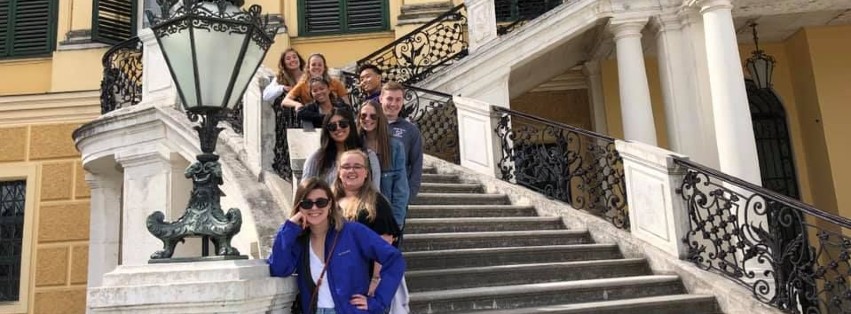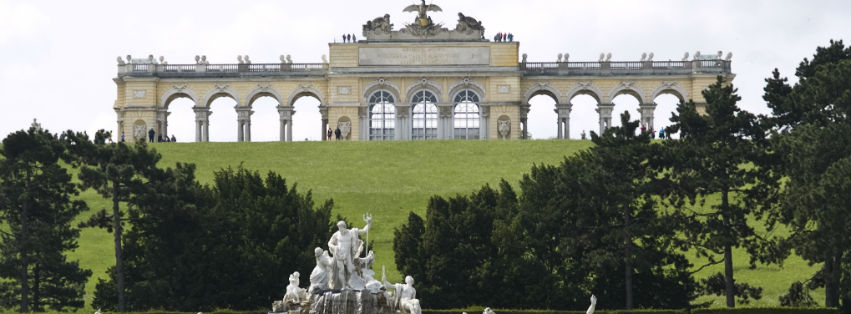Location
Vienna, Passau, Graz, Split, Sarajevo, Austria, Germany, Croatia, Bosnia and Herzegovina
Program Description
How can groups that follow different religions or speak different languages live together in democracies? What happens when difference leads to conflict? How can places that have seen civic conflict rebuild democratic, stable, and inclusive societies? This study abroad trip examines these questions across Austria, Croatia, and Bosnia and Herzegovina.
The trip begins at the center of the Habsburg Empire in Vienna and moves to the borderlands of Graz in Styria, Split in Croatia, and Sarajevo in Bosnia and Herzegovina. Students complete two three-credit classes in Political Science (POSC 361: Topics in International Relations – Politics of Identity and Place and POSC 371: Topics in Comparative Politics – Politics of Southeastern Europe). The courses require some film and writing assignments to be completed before the beginning of the trip. There is a classroom portion of the courses in Graz and experiential portions in Vienna, Graz, Split, and Sarajevo.
POSC 361: Topics in International Relations – Politics of Identity and Place This course explores how a person’s sense of belonging to a group or connection to a place impacts the ways that he or she acts politically. To do this, we will examine the roots of ethnicity, nationality, and citizenship as well as the variety in the way that people experience belonging to a group and act upon that feeling of belonging. Ethnicity and nationality are rooted in each individual’s sense that he or she is a part of a larger whole with a history and a future intertwined with that of the individual. This larger group may be defined by political, societal, economic, and cultural factors. However, close inspection reveals that this relationship is very complicated. The goal of this course is to explore these ideas in the context of Austria, Croatia, and Bosnia over the last century. This area is fruitful for such an exploration precisely because there has been such a dramatic change in the last hundred years. People have been split, new groups have been formed, and the advent of the European Union offers a new challenge to identity, just as the persistence of national feeling places a limit on the future of the EU.
POSC 371: Topics in Comparative Politics – Politics of Southeastern Europe This course examines the politics of Southeastern Europe with a focus on historical roots and contemporary dynamics as well as on internal and external causes for the shape of politics in the region. In short, the course aims to understand the source of the region’s reputation as a fractured, unstable region. Major course topics include the impact of empire on the social and political landscape, the fall of communism and democratization in the region, the different ways in which countries of the region experience and handle difference, and the impact of the European Union.
Location Description
The course begins in Vienna, a multicultural city formerly at the center of a broad empire. Vienna’s place in the empire made it one of the most important cities in Europe, and it continues to be a connecting point among East, West, and South. The majority of the course takes place in Graz, the “Green Heart of Austria”, which lies on the border between the German and Slavic portions of the old empire and continues to be a cultural, economic, and political link between Central Europe and Slovenia, Croatia, Bosnia, and Serbia to the south. Graz is the second-largest city in Austria and is home to six universities, totaling more than 40 thousand students. It is situated between the Alps and the rolling hills of the wine country that borders Slovenia.
Finally, we will take a two-week bus excursion into the former Yugoslavia, first to the coastal city of Split, with its Roman, Italian, and Croatian roots as well as gorgeous coastline, and then to Sarajevo in Bosnia and Herzegovina. The two cities draw their beauty from centuries of cultural exchange, although their presence on the boundary between empires and states has also brought great tragedy and suffering.
Director
John Hulsey | hulseyjw@jmu.edu | Political Science
Accommodations
Accommodations will be in a hostel in Vienna and in hotels for the other three cities. In the hostel, the students will be in a shared accommodation with 2-6 other JMU students. In the hotels, the students will be in 2-3 bedrooms. All of the places we'll stay are centrally located.
In Vienna and Graz, students will receive 30 Euros per day for food, as breakfast is not included at our accommodation. In Split and Sarajevo, students will receive 20 Euros per day, since the hotels provide breakfast. While it is possible to get by only on this allotment, most students spend more. All of our accommodations are located in areas with a variety of food options including grocery stores, bakeries, and restaurants.
Additional Items to Consider
US citizens are not required to get a VISA for any of the four countries.
Students are encouraged to arrange an international data plan for their phones.
Students will watch some movies and documentaries and write short essays before departure.
Applicant Criteria
Applicants must have a minimum GPA of 2.0
Open to sophomores, juniors, and seniors of all majors
Open to non-JMU students
Application Process
This list serves as an application preview. To apply, students will need to complete the following:
- Study Abroad Online Application ($40 fee)
- Short essay
- Official transcript required for non-JMU students
Further details and instructions about these application requirements will be available upon log-in.
Application Deadline
Dates
All dates are tentative and subject to change
Courses
POSC 361: Topics in International Relations: Politics of Identity, Place and Conflict (3 credits)
POSC 371: Topics in Comparative Politics: Politics of Southeastern Europe (3 credits)
Courses listed here are to be used as a general guideline for program curriculum. *All courses are considered pending until approved by the Academic Department, Program, and/or College.




